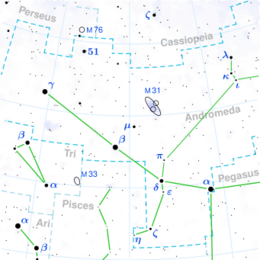Astronomy:58 Andromedae
| Observation data Equinox J2000.0]] (ICRS) | |
|---|---|
| Constellation | Andromeda |
| Right ascension | 02h 08m 29.25999s[1] |
| Declination | +37° 51′ 32.6861″[1] |
| Apparent magnitude (V) | 4.78[2] |
| Characteristics | |
| Spectral type | A5 IV-V[3] |
| B−V color index | 0.120±0.003[2] |
| Astrometry | |
| Radial velocity (Rv) | 7.60±1.78[2] km/s |
| Proper motion (μ) | RA: +154.296[1] mas/yr Dec.: −43.304[1] mas/yr |
| Parallax (π) | 17.5326 ± 0.2911[1] mas |
| Distance | 186 ± 3 ly (57.0 ± 0.9 pc) |
| Absolute magnitude (MV) | 0.94[2] |
| Details[4] | |
| Mass | 2.00 M☉ |
| Radius | 1.9[5] R☉ |
| Luminosity | 35.55[2] L☉ |
| Surface gravity (log g) | 3.89±0.14 cgs |
| Temperature | 8,875±302 K |
| Metallicity [Fe/H] | −0.98[6] dex |
| Rotational velocity (v sin i) | 135[7] km/s |
| Age | 425 Myr |
| Other designations | |
| Database references | |
| SIMBAD | data |
58 Andromedae, abbreviated 58 And, is a single[9] star in the northern constellation Andromeda. 58 Andromedae is the Flamsteed designation. It is visible to the naked eye with an apparent visual magnitude of 4.78[2] The distance to this star, as determined from its annual parallax shift of 17.5 mas,[1] is 186 light years. 58 And is moving further from the Earth with a heliocentric radial velocity of +8 km/s.[2] It has a relatively high proper motion, traversing the celestial sphere at the rate of 0.159″ per year.[10]
This star is 425 million years old with a stellar classification of A5 IV-V,[3] indicating the spectrum displays mixed traits of an A-type main-sequence star and an older subgiant star. It is spinning rapidly with a projected rotational velocity of 135 km/s, which is giving the star an oblate shape with an equatorial bulge that is 6% larger than the polar radius.[7] The star has double[4] the mass of the Sun and about 1.9[5] times the Sun's radius. It is radiating 36[2] times the Sun's luminosity from its photosphere at an effective temperature of 8,875 K.[4]
References
- ↑ 1.0 1.1 1.2 1.3 1.4 1.5 Brown, A. G. A. (August 2018). "Gaia Data Release 2: Summary of the contents and survey properties". Astronomy & Astrophysics 616: A1. doi:10.1051/0004-6361/201833051. Bibcode: 2018A&A...616A...1G.
- ↑ 2.0 2.1 2.2 2.3 2.4 2.5 2.6 2.7 Anderson, E.; Francis, Ch. (2012), "XHIP: An extended hipparcos compilation", Astronomy Letters 38 (5): 331, doi:10.1134/S1063773712050015, Bibcode: 2012AstL...38..331A.
- ↑ 3.0 3.1 Cowley, A. et al. (April 1969), "A study of the bright A stars. I. A catalogue of spectral classifications", Astronomical Journal 74: 375–406, doi:10.1086/110819, Bibcode: 1969AJ.....74..375C.
- ↑ 4.0 4.1 4.2 David, Trevor J.; Hillenbrand, Lynne A. (2015), "The Ages of Early-Type Stars: Strömgren Photometric Methods Calibrated, Validated, Tested, and Applied to Hosts and Prospective Hosts of Directly Imaged Exoplanets", The Astrophysical Journal 804 (2): 146, doi:10.1088/0004-637X/804/2/146, Bibcode: 2015ApJ...804..146D.
- ↑ 5.0 5.1 Pasinetti Fracassini, L. E. et al. (February 2001), "Catalogue of Apparent Diameters and Absolute Radii of Stars (CADARS)", Astronomy and Astrophysics 367 (2): 521–524, doi:10.1051/0004-6361:20000451, Bibcode: 2001A&A...367..521P.
- ↑ Gebran, M. et al. (2016), "A new method for the inversion of atmospheric parameters of A/Am stars", Astronomy & Astrophysics 589: A83, doi:10.1051/0004-6361/201528052, Bibcode: 2016A&A...589A..83G.
- ↑ 7.0 7.1 van Belle, Gerard T. (March 2012), "Interferometric observations of rapidly rotating stars", The Astronomy and Astrophysics Review 20 (1): 51, doi:10.1007/s00159-012-0051-2, Bibcode: 2012A&ARv..20...51V.
- ↑ "58 And". SIMBAD. Centre de données astronomiques de Strasbourg. http://simbad.u-strasbg.fr/simbad/sim-basic?Ident=58+And.
- ↑ De Rosa, R. J. et al. (2014), "The VAST Survey - III. The multiplicity of A-type stars within 75 pc", Monthly Notices of the Royal Astronomical Society 437 (2): 1216–1240, doi:10.1093/mnras/stt1932, Bibcode: 2014MNRAS.437.1216D.
- ↑ Lépine, Sébastien; Shara, Michael M. (March 2005), "A Catalog of Northern Stars with Annual Proper Motions Larger than 0.15" (LSPM-NORTH Catalog)", The Astronomical Journal 129 (3): 1483–1522, doi:10.1086/427854, Bibcode: 2005AJ....129.1483L.
 |

